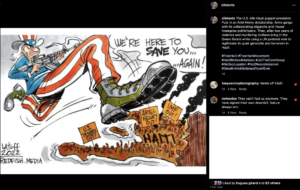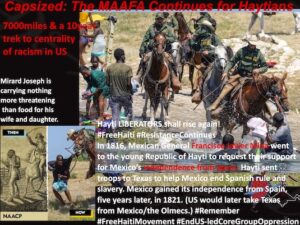“In Haiti (in 1995), I was making about $800,000 or $900,000 a year. I lived in the lap of luxury, with a huge estate with gardens, gardeners, maids, cooks, laundry women. It was a lifestyle that would take me a lot more work to accomplish in the United States.” — A U.S. businessman, 1995
(An inside look at Haiti’s business elite)
*********
Ezili Dantò’s Note: The article featured below – “An inside look at Haiti’s business elite” – was written 16-years ago. Nothing has changed for Haiti’s poor majority, except the Haiti holocaust worsened a million times with the 2004 UN/US occupation that replaced Haiti’s democratically elected government while the rich U.S. and Haiti oligarchy business elite make more money in Haiti. The poor masses suffer famine, UN slaughter, rape, abuse, imported UN cholera, indefinite detention, flooding, hurricanes, apocalyptic earthquake, elections-without-an -electorate and now the outright return of the US-supported despot, Jean Claude “Baby Doc” Duvalier. It is beyond obscene the lengths the US, France, Canada, the false-charity NGOs and the International Community will go to secure the privilege of the rich few. It’s depravity at its zenith and very hard to know and write about. Today, 16-year after the article below was written, under UN occupied Haiti and Bill Clinton/U.N./Paul Farmer/Congressional Black Caucus-sweatshop “development” for Haiti, the minimum wage is $3.05 PER DAY. President Aristide who tried to bring up the minimum wage was deported to Africa and forbidden to return to Haiti. Recently, on the subject of the return of the democratically elected President Aristide, Obama’s government, said:
Regarding the democratically elected, president Jean Bertrand Aristide:
“today Haiti needs to focus on its future, not its past,” (from State Department spokesman P.J. Crowley, Jan. 2011)
Regarding the dictator,
Jean Claude “Baby Doc” Duvalier:
“this is a matter for the Government of Haiti and the people of Haiti.” (P.J. Crowley, Jan. 2011)
Ezili Dantò of HLLN
“The Haiti scream gatherer”
January 26, 2011
( See also, Prisoners on Their Own Island: An Interview With Ashley Smith on Haiti and the NGOs ; and TRAVESTY in Haiti .)
***************
Interview
An inside look at Haiti’s business elite
Original Source: Multinational Monitor
Date: Sunday, January 1, 1995
Reposted at ezilidanto.com on Aug. 21, 2004 and here, on January 26, 2011
“It’s even worse than slavery, really, because at least with slavery you were offered some fringe benefits, as far as housing. In this situation, you’re offered hard labor and that’s it.”
An Interview with Patrick James
Patrick James is the alias of a U.S. businessperson who previously lived and worked in Haiti. This interview was conducted prior to the negotiated ouster of the illegal Haitian military government and the restoration of President Jean-Bertrand Aristide, but it remains relevant and timely for the insights it provides about class divisions, power, exploitation and human rights in Haiti.
Multinational Monitor: How would you characterize the Haitian business class as a community?
Patrick James: The interconnectedness of the Haitian business community is amazing. I worked for a company and the guy right across the hallway from me, one of the partners, was General Cedras’s brother; the other was a European businessman. My company had one partner whose sister is married to the European businessman, who’s in business with Cedras’s brother. The elite are somehow interconnected or related. Basically they have to work together in order to keep their power intact.
You can imagine what kind of pressure that must be when you know that there are six million peasants that basically could rise up and tear your house down some night, which, also, I experienced. I’ve witnessed what they call dechoukage where they just basically firebomb, loot and gut a house. Its a terrifying thing.
This is always in the mind of the elite Haitians. They ride around in their armored vehicles, they have their Uzis in their house. It’s not uncommon to hear machine gun fire when you’re in Port-au-Prince just because there’s a thief trying to break in somewhere. And you’d better believe these rich people have got machine guns. The poorest Haitians cannot rise up. I mean there will not be a revolution in Haiti because you cannot fight these machine guns with sticks and rocks and machetes. There’s only so far you can fight.
MM: Where do the U.S. businesses fit into that whole picture economically and politically? Are they part of that elite?
James: The rich Haitian families basically run their own empires. You have partnerships with American businessmen, European businessmen that are very lucrative because you have a monopoly situation in Haiti. There are only a certain amount of players, and if you can provide something that no one else can provide, you’re in. If you have a sister-in-law that’s, say, from Vietnam or Thailand who has connections who can get you all the rice you want to import, then you’re the guy that owns the rice market in Haiti.
MM: What are the leading empires?
James: There are probably a group of about 30 families, big families. Then, after that, maybe another hundred or two hundred [at the] next level. There aren’t many people, relative to the entire population, running the show. And, let me tell you, the wealth is unbelievable. I know some of these people that send their kids to private schools in Florida and Switzerland, grammar schools where they’re paying $18,000 a year for one child’s tuition. They are multi-, multi-millionaires. They have a monopoly on the situation. They’re maybe importing rice, then they may export coffee or oranges or whatever. And of course they are making their money from the sweat and blood of the poor Haitian, who’s making maybe $20 a month, if he’s lucky.
lood of the poor Haitian, who’s making maybe $20 a month, if he’s lucky.
MM: Have the labor costs been that low for a long time?
James: Always, and the rich plan to keep it that way, that’s how they make their money. Slavery is alive and well in Haiti. That’s what it is, slavery. It’s even worse than slavery, really, because at least with slavery you were offered some fringe benefits, as far as housing. In this situation, you’re offered hard labor and that’s it. If you get enough money to buy a machete so you can chop down a few trees to weave together a hut and pack mud on the side of it, good for you. If not, tough luck. They don’t provide housing, they don’t provide food for these people, they just use them for labor.
The first day I was at my office, one of the Haitian businessmen came in and I said, “I can’t believe how poor these people are.” This guy was one of the elite, light skin, blue eyes, and he said to me: “Oh yeah, we have to keep these people tired and hungry, otherwise they’ll rise up against us.”
MM: Do you think people would rise up if they had more resources?
James: No doubt about it. That’s the thing the [elite] Haitians are so afraid of. When there’s a mob mentality, anything can happen. I remember the night of the coup, I was asleep in bed. At about one o’clock in the morning I heard loud explosions, gunfire, chanting, screaming. I got up and looked out of my bedroom window. I was up on the side of a mountain and I could look down over the whole city. I saw different places on fire and I could tell there was something wrong. So I went outside to ask the night watchman what was going on. He was listening to the radio and said something happened to Aristide. I asked myself, “Am I the good guy or the bad guy?” I didn’t know. I didn’t know if the average Haitian would look at me as a white, a blanc, as the enemy, or if I was just someone that was not involved in the situation so they wouldn’t even bother me. I didn’t know what to do and I heard people chanting, coming up the side of the mountain. I could see different places on fire already on the mountainside.
So I turned around and went back to my house. I went back into my room and packed my backpack and I took the machete from under my bed and I went back outside to the night watchman. I asked him what we should do, and he said he didn’t know. So we hid. It was a bright moonlit night and we hid in the garage. I could see now there was a crowd out in front of the house, probably 200 people, flaming torches and machetes, and of course I start sweating bullets. They started chopping down the fence and the night watchman said, “We have to go out, otherwise they’re going to come in here.” So I just kind of took a deep breath, and the two of us walked into the moonlight and held our machetes. And I just remember looking up and at that point I could hear them yelling “Blancs, blancs, blancs restent ici,” meaning, “Whites stay here, whites live here.” And then, one by one, they started running away.
I spent the next two or three nights crawling around on my hands and knees on the floor listening to bullets whizzing by, and to gunfire.
During one of those days, I went over to a hotel where a bunch of my friends lived. I was sitting on the terrace of the hotel with the owner of the hotel, drinking coffee, talking about the situation, and all of a sudden I hear some screaming and I hear a truck winding up the mountainside. Suddenly, they let the back of the truck down and all the soldiers pile out and start chasing people around the hotel shooting them!
MM: Who were they chasing?
James: Just average Haitians. So the owner of the hotel and I wondered what the hell was going on. The two of us just stood up and went out and stood on the veranda with our hands on our hips watching this. And these guys went around and actually shot people, and went up on the side of the mountain, burned down people’s huts, and basically terrorized people.
MM: Why were they doing that?
James: Just to scare them. To let them know that the military is here; we’re in charge again; the Aristide movement is over; don’t even think about rising up or trying to get any power. What could I do? They acted as if the owner of the hotel and I weren’t even there. I was just a bystander.
MM: You were safe. They weren’t going to attack you?
James: No. At this point I started to realize, well, there’s something going on here that I don’t understand.
MM: What was that?
James: Well, that’s when I realized that the military was on the side of the rich and that, as an American, I had nothing to worry about. And that was the case most of the time in Haiti.
MM: Does the U.S. business community fear an uprising?
James: I don’t think the American business community has to worry about it as much, because they have got less to lose, they’ve got a place they can fly away to. It’s the Haitian business community that basically keeps the system in place.
Of course, if you’re an American businessman and you’re offered to become a part of this system where your risks are much lower than they are for the average Haitian business person but your profits are equal, of course you’re going to buy into the system. It’s a good deal. In Haiti, I was making about $800,000 or $900,000 a year. I lived in the lap of luxury, with a huge estate with gardens, gardeners, maids, cooks, laundry women. It was a lifestyle that would take me a lot more work to accomplish in the United States.
MM: How profitable are the U.S. companies that have assembly operations in Haiti?
James: These companies benefit from Caribbean Basin Initiative tax incentives for companies that import materials from the United States and then process them in Haiti and send them back. And of course being able to take advantage of the labor costs in Haiti is very advantageous. As far as the profits they take out, I would only be speculating.
The problem for these companies is the political situation and the instability. Companies are not willing to invest a lot in setting up a manufacturing plant in Haiti for the very reason that happened a couple years ago. You have a coup, and all of a sudden you don’t know whether there’s going to be an embargo placed on you or what. If you have orders to fill, people don’t like to hear that you’re in Haiti, because if they’re going to make a contract to sell these certain products, they want to make sure you’re going to be able to deliver. So this is a big problem for Haiti and a big obstacle as far as having any long-term investment in manufacturing.
MM: So most of the foreign investment has been for light assembly that goes in and out?
James: They have made a very low investment because they have portable machinery that they can pack up and pull out any rime things start to get a little hot.
The U.S. Agency for International Development did a report a few years ago where it talked about the importance of the low wages as a big advantage for U.S. companies. How can you beat $5 a day in wages?
MM: Do you think the U.S. firms feel they have a stake in maintaining that system?
James: I would imagine that there are reasons why the Americans would want to keep that system in place. One being the cost advantage. Another that they provide fruits and other commodities at very low prices. If their wage costs start rising, then the costs of their products are going to start rising and all of a sudden mangoes cost a lot more money in Florida.
The U.S. Agency for International Development did a report a few years ago where it talked about the importance of the low wages as a big advantage for U.S. companies. How can you beat $5 a day in wages?
MM: Do you think the U.S. firms feel they have a stake in maintaining that system?
James: I would imagine that there are reasons why the Americans would want to keep that system in place. One being the cost advantage. Another that they provide fruits and other commodities at very low prices. If their wage costs start rising, then the costs of their products are going to start rising and all of a sudden mangoes cost a lot more money in Florida.
MM: Do you think the U.S. government fears a possible uprising?
James: An uprising of the peasant majority? There’s no way that the Haitian peasants can rise up. You have one section of the black population which is now aligned with and making money with the rich. Not much, but more than they could make as a farmer cutting mangoes. So now they have a gun and are in control. They’re making a few bucks. The rich tell them to go out and take down some village, shoot up a couple of people, chop their face off, leave them in the street, and they’ll do it.
MM: How might U.S. intervention work to keep a lid on the situation?
James: Whether or not the United States wants to prevent the Haitian population from rising up, I think they should align themselves, or at least work with, the military. Try to separate the police force from the military so that there is some type of civilian protection. They should try not to go in as the aggressors who are trying to wipe out the military, but to go in and say “we’re here to retrain the army; we’re here to work with the army.”
MM: Did you have a sense of how the U.S. embassy or U.S. business people felt about Aristide’s coming to power, and the whole popular movement?
James: I think there was worry about how far Aristide was pushing, especially for a minimum wage, trying to set up a social security system, things like this.
When Aristide first came in he said, “There’s going to be a mandatory $5 minimum [daily] wage, everybody has got to do it.” It was just so outlandish that nobody even took it seriously. You figure the average Haitian probably makes about 20 dollars a month, so you’re talking about five dollars a week to five dollars a day!
MM: What impact would that have on the way the Haitian economy works?
James: For the average worker, it would have increased their wages, so income would have increased. The effect on the economy would have been inflationary because the businessman is not going to settle for not making enough money. All prices would increase relative to the currency exchange. It would have balanced out ultimately, but the initial impact would have been a strain on the businessman.
MM: What kind of profits do local business people usually make?
James: I would say the average retailer will make something like a 60 percent profit. As far as importing and then distributing, a lot depends on the currency exchange. Right now [during the embargo], profits may be as high as 400 percent – that’s just the law of supply and demand. When you have sanctions that are limiting the supply, of course your prices are going to increase.
So Aristide, I think, had some ideal things he wanted to accomplish, but he just moved too fast. He didn’t consider the establishment that had been in place for 200 years, and out of his frustration he started making very passionate and radical speeches about how to break down the economic system that was in place. And, unfortunately, he pushed too far.
MM: What was the overall business objection to social security?
James: My own personal fear was that I didn’t know how long this government would last, so I didn’t want to start putting money into a fund that could disappear and then wonder who’s getting all the money when the next coup takes place. I told government officials who asked for social security payments that I wasn’t going to pay into it, that I’d rather give my workers extra money every week.
MM: Did many businesses react that way?
James: I think there were probably some that had more pressure on them than I did, especially if they were Haitian run. Because I was an American, because I was white – it sounds pretty arrogant – I could basically call whatever shots I wanted just because of the color of my skin and my eyes. I could say: “No, I’m not doing it.”
MM: Even when it comes to paying a tax?
James: Yes, yes, and I didn’t do it.
******************************************************************
Forwarded by Ezili’s Haitian Lawyers Leadership Network (“HLLN“) *****************************************************************
“For me and other anthropologists and missionaries working in the country, the many coups and uprisings in the late 1980s and early 1990s were more an inconvenience than a threat. We were not targets and could resign ourselves to working around them. So while the military was gunning people in the Port-au-Prince slums, I chartered a small plane in Miami and flew into the city of Cape Haitian…That night soldiers shot two young men in the street below my hotel window. (During the three days that followed the ouster of Aristide by military leaders, the CIA trained narcotraffickers described in an earlier chapter…at least 3,000 people were slaughtered in the Port-au-Prince slums)… But for the most part, Cape Haitian was quiet. Within several days, I boarded a Haitian sailboat and 36 hours later I sailed into Baie-de-Sol harbor. And that is where I met Sharon, sunbathing on a beach. She invited me to lunch with her parents, siblings and the other teachers. We became friends …in the ensuing nine years” (TRAVESTY in Haiti : A true account of Christian missions, orphanages, fraud, food aid and drug trafficking A book by Timothy T. Schwartz, Ph.D. Reviewed by Ezili Dantò/HLLN, December 2009. )
****************************************
********************Building wealth, power and their resumes on the tears of Haiti children:
Colonization of Haiti’s food and seeds is not earthquake relief
http://ning.it/aZf9RO;The Poverty Pimps’ Masturbating on Black Pain: Monsanto joins the pack http://ning.it/cXtCV6 ;
Vision of Plantation Haiti – A White Pearl, Again!
http://bit.ly/bwY2tJ ;The Plantation called Haiti: Feudal Pillage Masking as Humanitarian Aid
http://bit.ly/929NXSTell The Truth About Haiti Forum with Ezili Dantò of HLLN
http://bit.ly/cY9oD1 ;Sarkozy’s visit to Haiti, Independence Debt and Sovereignty
http://bit.ly/9XMEAl ;A message to Paul Farmer, the Senate, Dobbins & Francois
http://bit.ly/dbjfio , and– Haiti’s Voiceless Speaks to New York Times: Where’s the call for investigation into UN Slaughters in Haiti? http://bit.ly/bugX9l
Haiti, Genocide and the New Slavery Model, 2009
http://bit.ly/17KJGe
*
Oil in Haiti reasons for the US occupation, Part one (http://bit.ly/IausQ) and Part 2 (http://bit.ly/d7f8Cw)
Did mining and oil drilling trigger the Haiti earthquake? Jan 22, 2010 – http://bit.ly/74Klj3
*
http://bit.ly/d4m7eB
Disaster Capitalism in Haiti, New Orleans, Congo, Pakistan
Add a comment:
Powered by Facebook Comments








